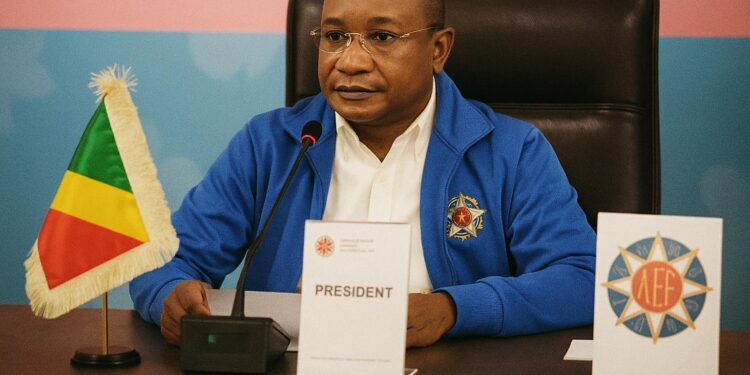A Quiet Mandate Renewal in Brazzaville
In a ceremony that blended military punctilio with alumni camaraderie, Colonel-Major Rémy Ayayos Ikounga was unanimously re-elected on 6 July to preside over the Association des Anciens Enfants de Troupe of Congo-Brazzaville. The ballot, held in the historic officers’ hall of Brazzaville, produced no rival candidacy, a fact interpreted by observers from Les Dépêches de Brazzaville as evidence of broad satisfaction with the incumbent’s performance (Agence Congolaise d’Information, 8 July 2024). For a constituency composed of retired officers, civil servants and entrepreneurs schooled at the General Leclerc Military Preparatory School, stability at the top is not a mere formality; it is a strategic choice designed to preserve an organisational culture that prizes discipline and collective responsibility.
Continuity at the Helm of AAET
Addressing the assembly moments after the vote, Ayayos Ikounga vowed to “conduct our vessel safely to harbour with honour and dignity”. His rhetoric, steeped in naval metaphor, resonated with the body’s tradition of framing civic engagement as a continuation of cadet service. Delegates endorsed the motion to extend the mandate of the entire executive, citing ‘rigour, tolerance and cohesion’ as hallmarks of the outgoing term, according to the official communiqué issued by the Ministry of National Defence.
Financial statements approved during the conclave disclosed a prudent surplus, largely attributed to tighter auditing and a modest uptick in membership fees. Those metrics have weight in Brazzaville’s policy circles, where veteran organisations often serve as interlocutors between the state and local communities on issues ranging from disaster response to youth mentoring.
Solidarity as a Diplomatic Resource
Ayayos Ikounga placed particular emphasis on solidarity, describing it as the linchpin without which ‘performance cannot be durable nor honourable’. Within Congolese political vernacular, solidarity extends beyond mutual aid; it gestures toward nation-building in a landscape still navigating the aftershocks of regional volatility. Diplomatic analysts at the Marien Ngouabi University note that alumni networks of military academies in Central Africa frequently act as informal confidence-building mechanisms, facilitating dialogue across national boundaries during sub-regional crises.
In that sense, the AAET’s pledge to reinforce its scholarship fund for disadvantaged cadet families acquires an external dimension: by promoting educational continuity, the association buttresses the human capital pipeline that feeds not only the Congolese armed forces but also peacekeeping contingents in multilateral operations.
Engaging the Next Generation of Cadet Alumni
A recurring concern voiced by senior delegates is the tepid involvement of recent graduates, many of whom pursue civilian careers abroad. The re-elected president responded by urging ‘young promotions’ to honour statutory obligations and to view the association as a platform for professional networking rather than a nostalgic club. Planned outreach includes digital registration drives and mentorship schemes pairing junior engineers or medical officers with retired generals, initiatives that mirror best practices identified in a 2023 African Union policy paper on veteran affairs.
Such efforts gain urgency as the association assumes a leading role in preparing the eightieth anniversary of the General Leclerc Military Preparatory School, founded in 1944 by Free-French forces. The commemorations, slated for early 2025, are expected to attract delegations from allied military academies in France, Cameroon and Gabon, offering Brazzaville an opportunity to underscore its historical contribution to regional security architectures.
Implications for Congo’s Defence Diplomacy
From a diplomatic vantage point, the AAET’s internal cohesion carries symbolic value for President Denis Sassou Nguesso’s broader agenda of projecting Congo-Brazzaville as a contributor to continental stability. By maintaining an active alumni corps rooted in military ethos yet engaged in civilian spheres, Brazzaville strengthens soft-power channels that complement formal defence agreements such as the 2022 bilateral cooperation accord with Kigali.
International partners have taken note. A French embassy spokesperson welcomed the re-election as ‘a sign of continuity conducive to deepening educational and defence ties’. Meanwhile, UN peacekeeping planners in New York privately acknowledge that alumni structures often facilitate rapid mobilisation of specialised personnel during emergency deployments, an advantage that smaller nations like Congo leverage to punch above their demographic weight.
Against this backdrop, Ayayos Ikounga’s new mandate appears less an administrative routine than a calibrated move to align veteran activism with national objectives of cohesion, professionalisation and diplomatic outreach. The vessel he commands is therefore more than an association; it is a discreet instrument of statecraft navigating the confluence of memory, service and strategic communication.












































